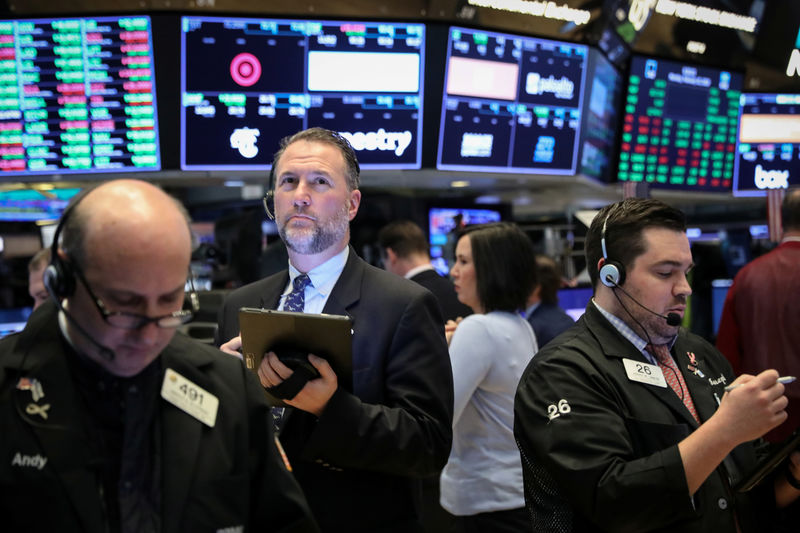Can anything shut down the Gold rally?
Investing.com-- The S&P 500 retreated from fresh record highs Wednesday, as investors weighed the prospect of a Federal Reserve rate cut as soon as next month and an ongoing slew of quarterly earnings.
At 2:44 p.m. ET (19:44 GMT), the Dow Jones Industrial Average gained 404 points, or 0.9%, the S&P 500 index climbed 0.2% after hitting a fresh record intraday high of 6,480.28, and the NASDAQ Composite was flat.
Fed rate cut expectations rise, but Bullard cools talk of bigger cut
Tame consumer price growth has lifted expectations of a rate cut by the Federal Reserve in September, with officials at the central bank seen opting to prioritize supporting a flagging labor market over still above-target price gains.
“Inflation was broadly in line with expectations as tariffs continue to be largely absorbed within U.S. corporate profit margins,” ING analysts said in a note. “This gives the Fed the room to respond to the weaker jobs backdrop and cut interest rates from September,” they added.
Analysts at BCA Research agree that the tepid inflation reading "tips the scales in favor" of a 25-basis point cut at the Fed’s next meeting in September. The ongoing slowing in the jobs picture is likely to also persuade policymakers to roll out one or two further quarter-point drawdowns before the end of the year.
A separate gauge of {{producer prices} } for final demand is scheduled for release on Thursday, while a metric of American {{retail sales} } and a survey of consumer sentiment will be published on Friday.
But expectations for a jumbo cut as much as 50 basis points at the upcoming September meeting were cooled somewhat after potential Fed chair nominee and former Fed president James Bullard downplayed the idea, saying it would signal panic.
Atlanta Fed president Raphael Bostic, meanwhile, continued to lean against a sooner rate cut, saying on Wednesday that the Fed has the luxury to wait as the labor makret remains strong.
Powell’s replacement under consideration
The Trump administration is evaluating 11 candidates to replace Federal Reserve Chairman Jerome Powell when his term expires in May, according to CNBC.
The report said three previously undisclosed candidates have been added to the list: Jefferies Chief Market Strategist David Zervos, former Fed Governor Larry Lindsey, and BlackRock’s Rick Rieder, who serves as chief investment officer for global fixed income.
These new names join eight other candidates already under consideration, including Fed Vice Chair for Supervision Michelle Bowman, Fed Governor Chris Waller, and Fed Vice Chair Philip Jefferson.
Additional candidates include Marc Summerlin, who served as an economic advisor in the Bush Administration, Dallas Fed President Lorie Logan, and former St. Louis Fed President James Bullard. National Economic Council Director Kevin Hassett and former Fed Governor Kevin Warsh are also being considered for the position.
Cisco’s earnings in focus
On the earnings calendar, Cisco Systems (NASDAQ:CSCO) is set to kick off a string of releases from companies whose reporting quarter finished at the end of July.
The results, due out after the closing bell, are anticipated to beat expectations thanks partially to "general strength" in Cisco’s firewalls business and cybersecurity subscribers, according to analysts at Piper Sandler.
"Cisco is still experiencing net-momentum into the second half, with early networking prints a good signal for the space and 2026 likely a good refresh period," the analysts led by James Fish wrote.
Elsewhere, CAVA (NYSE:CAVA) stock fell sharply after the Mediterranean food chain reported lower-than-expected second-quarter revenue driven by weak same-store sales growth. The company also lowered its full-year forecast for same-store sales.
Kroger (NYSE:KR) stock fell after Amazon (NASDAQ:AMZN) announced a significant expansion of its grocery delivery service, potentially threatening traditional supermarket chains.
CoreWeave Inc (NASDAQ:CRWV) slumped after losses widened much more than expected in Q1, owing to a jump in expenses, which Deutsche Bank attributed the cost of serving incremental demand.
— The artificial intelligence infrastructure provider dropped about 9% despite it posting better-than-expected revenue for the second quarter. During an earnings call with analysts, Chief Financial Officer Nitin Agrawal said revenue growth remains capacity-constrained as demand outstrips supply.
Peter Nurse, Ayushman Ojha contributed to this article
